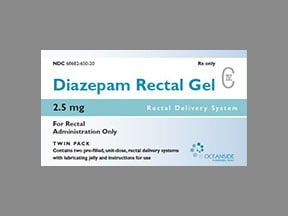
Diastat Pediatric Coupons & Savings Card – Discount Prices from $78.92
Brand for: Diazepam
My prescription
Edit
2.5MG, Diazepam (1 Gel)
Select pharmacy

CVS
$106.66
COUPON PRICE
Walgreens
$78.92
COUPON PRICE
Walmart
$246.48
COUPON PRICE
Albertsons
$267.00
COUPON PRICEDiastat Pediatric savings card
Show this card to your pharmacist
Walgreens
$78.92
BIN
ID
PCN
GRP
015995
LHKPY243219
GDC
DR33
Powered by
More prescriptions for spasticity
More prescriptions for spasticity
Price history for Diastat Pediatric (brand) & Diazepam (generic)
1 Gel, 2.5MG
Average retail price for Diastat Pediatric
Average retail price for Diazepam
Average SaveHealth price for Diazepam
Our price history data is based on aggregated prescription data collected from participating pharmacies in America. Our prescription data updates daily to reflect the latest price changes. If you notice a missing data point, it means there wasn't sufficient data available to generate a monetary value for that date.
Over the last 12 months, the average discount price of Diastat Pediatric is $182.30 using the SaveHealth savings card. That's an average savings of 48.21% on Diastat Pediatric with our discount card.
*Retail prices are based on pharmacy claims data, and may not be accurate when we don't have enough claims.
Diastat Pediatric (Diazepam) dosage forms
Dosage Quantity Price from Per unit 2.5MG 1 Gel $106.66 $106.66
| Dosage | Quantity | Price from | Per unit |
|---|---|---|---|
| 2.5MG | 1 Gel | $106.66 | $106.66 |
Why is diazepam given rectally in children?
Diazepam is administered rectally in children primarily for the management of acute seizures or status epilepticus. This route is used because it allows for rapid absorption and onset of action, which is crucial in emergency situations where intravenous access may be difficult to obtain quickly. Additionally, rectal administration can be more practical and less distressing for both the child and caregiver in a home or non-hospital setting.
Why is diazepam given rectally?
Diazepam is administered rectally primarily for the rapid treatment of seizures, especially in emergency situations such as status epilepticus. The rectal route allows for quick absorption into the bloodstream, providing a faster onset of action compared to oral administration. This method is particularly useful when intravenous access is not available or practical.
Using the SaveHealth discount card, what is the price of Diastat Pediatric without insurance?
Using the SaveHealth discount card, the price of Diastat Pediatric without insurance is $78.92.
What is the price of Diastat Pediatric at CVS?
The price of Diastat Pediatric at CVS is $106.66.
What is the price of Diastat Pediatric at Walgreens?
The price of Diastat Pediatric at Walgreens is $78.92.
What is the price of Diastat Pediatric at Walmart?
The price of Diastat Pediatric at Walmart is $246.48.
